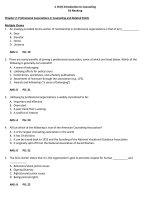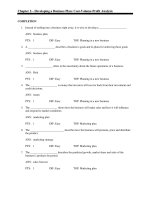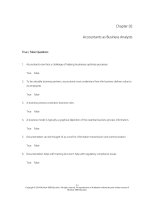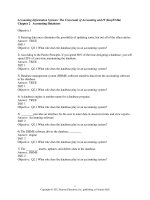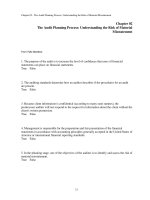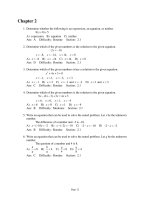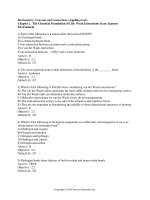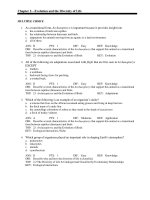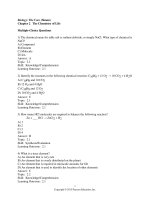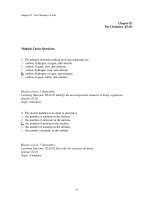Public speaking matters 1st edition floyd test bank
Bạn đang xem bản rút gọn của tài liệu. Xem và tải ngay bản đầy đủ của tài liệu tại đây (411.66 KB, 14 trang )
Test Bank
Chapter 2: Manage Speech Anxiety
Learning Objectives
Identify problematic thought patterns.
Recall methods for making self-messages more constructive.
Name two distinct sensations caused by speaking anxiety.
Review why speaking anxiety makes your mind go blank.
Identify the effects of the fight-or-flight response on a speaker who is experiencing
speaking anxiety.
Define stress.
Identify ethical expectations for helping classmates combat their speaking anxiety.
Define anticipatory anxiety.
Identify physical effects of speaking anxiety.
Recall the five ways speaking anxiety affects behavior.
Determine the primary effects of public speaking anxiety on the mind, body, and
behavior.
Identify five methods for working with speaking anxiety to help you present well.
Know that speaking anxiety is normal.
Define visualization.
Define desensitization.
Recall the benefits of positive self-talk.
True/False
1. Public speaking anxiety can be irritating but rarely interferes with the ability to
deliver a speech.
Answer: False
Level: Understanding
Topics: Public speaking anxiety; Public speaking anxiety awareness
2. All-or-nothing thinking is a good technique to help overcome stage fright.
Answer: False
Level: Understanding
Topics: Intrapersonal communication; All-or-nothing thinking
3. A speaker's fight-or-flight response can cause them to avoid eye contact with their
audience.
Answer: True
Level: Remembering
Topics: Fight-or-flight response; Effects of public speaking anxiety
4. Stage fright is so common that scientists studying stress often use public speaking to
make their experimental subjects anxious.
Answer: True
Level: Remembering
Topics: Stress; Effects of public speaking anxiety
5. Scientifically speaking, public speaking is only a stressor if it threatens someone's
physical, financial, or academic well-being.
Answer: False
Level: Understanding
Topics: Stress; Effects of public speaking anxiety
6. Public speaking anxiety can begin as early as several hours before a speech.
Answer: False
Level: Understanding
Topics: Anticipatory anxiety; Effects of public speaking anxiety; Speech preparation
7. Public speaking anxiety is usually just as severe when discussing a topic you know
well as when you are speaking about something you are less familiar with.
Answer: False
Level: Remembering
Topics: Anticipatory anxiety; Effects of public speaking anxiety; Speech preparation
8. Scientists have found that people with a tendency to worry experience less physical
stress from public speaking than do non-worriers, because worrying is a form of
preparation.
Answer: False
Level: Understanding
Topics: Physical noise; Effects of public speaking anxiety
9. Men tend to develop higher levels of stress hormones as a result of public speaking
anxiety than women do.
Answer: True
Level: Remembering
Topics: Physical noise; Effects of public speaking anxiety
10. Most people can eliminate their public speaking anxiety with enough training and
experience.
Answer: False
Level: Understanding
Topics: Techniques to avoid speaking anxiety; Public speaking anxiety awareness
11. Anxiety can improve your public speaking performance.
Answer: True
Level: Remembering
Topics: Public speaking anxiety awareness; Effects of public speaking anxiety
12. You should use visualization to imagine what could go wrong during your speech so
you will be mentally prepared for problems.
Answer: False
Level: Understanding
Topics: Visualization; Performance techniques
13. Because each public speaking experience is unique, the desensitization technique is
of only moderate effectiveness in reducing stage fright.
Answer: False
Level: Understanding
Topics: Desensitization; Performance techniques
14. Giving speeches online in front of avatars (graphical representations of people) is
unlikely to help reduce stage fright.
Answer: False
Level: Remembering
Topics: Desensitization; Performance techniques
15. Research has shown positivity to be the most effective technique for reducing stage
fright.
Answer: False
Level: Understanding
Topics: Performance techniques; Speech preparation
16. Most of the effects of stage fright are unnoticeable to the audience.
Answer: True
Level: Remembering
Topics: Speech preparation; Public speaking anxiety awareness
Multiple Choice
1. Professional entertainers and public speakers
A. do not experience stage fright.
B. can suffer debilitating stage fright.
C. experience minor stage fright at most.
D. suffer different effects from stage fright than less experienced performers.
Answer: B
Level: Understanding
Topics: Public speaking anxiety; Public speaking anxiety awareness
2. Speech anxiety is essentially
A. a fear that others will not like you.
B. a fear that you will forget your speech.
C. a fear of strangers.
D. an uncontrollable instinct.
Answer: A
Level: Remembering
Topics: Public speaking anxiety; Self-messages
3. Intense public speaking anxiety
A. can prevent someone from speaking effectively.
B. requires professional psychological treatment.
C. can be fought through without too much difficulty if one really wants to.
D. is more common in women.
Answer: A
Level: Understanding
Topics: Public speaking anxiety; Effects of public speaking anxiety
4. During his speech, Dwayne repeated himself a few times, and seldom made eye
contact with the audience. He also demonstrated passion and knowledge about his
subject matter. To reduce the possibility of speech anxiety in the future, after his
speech he should
A. focus on his mistakes and plan for the perfect speech next time.
B. assume that he will receive a bad grade so he will not be disappointed.
C. concentrate on what he did well.
D. accept that he is mistake prone.
Answer: C
Level: Applying
Topics: Effects of public speaking anxiety; Self-messages; Speech preparation;
Intrapersonal communication
5. Which of the following is a constructive self-message?
A. Taking the pressure off by assuming your performance will go poorly
B. Adopting an all-or-nothing attitude that mistakes in your speech are not
acceptable
C. Admitting right away that a speech went poorly, not pretending that others
did not notice
D. Thinking about ways you improved on poor performances in the past
Answer: D
Level: Applying
Topic: Intrapersonal communication; Self-messages
6. Which of the following is not a good method for combatting stage fright?
A. Thinking of ways to make every speech perfect
B. Remembering how you have improved after past mistakes
C. Telling yourself that practice makes perfect
D. Waiting for feedback from others before judging yourself
Answer: A
Level: Applying
Topics: Intrapersonal communication; Self-messages
7. Which of the following are common effects of intense stage fright?
A. The desire to run away; fainting
B. Fainting; vomiting
C. The desire to run away; your mind going blank.
D. Your mind going blank; vomiting
Answer: C
Level: Remembering
Topics: Fight-or-flight response; Effects of public speaking anxiety; Forgetfulness
8. When a speaker's mind goes blank due to stage fright, it is because
A. most of their energy is committed to combatting the desire to flee.
B. they did not spend enough time planning what they wanted to say.
C. they are convinced that what they want to say is not good enough.
D. most of their energy is directed toward managing their anxiety.
Answer: D
Level: Understanding
Topics: Fight-or-flight response; Effects of public speaking anxiety
9. Hector is feeling very anxious about the presentation he is scheduled to give at
work. He asks his boss if it can be rescheduled for next week. This is an example of
A. his mind going blank.
B. a fight-or-flight response.
C. a negative self-message.
D. a constructive coping technique.
Answer: B
Level: Analyzing
Topics: Fight-or-flight response; Public speaking anxiety
10. Public speaking anxiety is experienced by roughly ______ adults.
A. 1 in 3
B. 1 in 5
C. 1 in 10
D. 1 in 25
Answer: B
Level: Remembering
Topics: Stress; Effects of public speaking anxiety
11. Those who only risk personal embarrassment from an episode of public speaking
may ______ situations where someone's career success is at stake.
A. suffer little stress compared to
B. suffer less severe stress than in
C. suffer stress just as debilitating as
D. not suffer any stress at all, as opposed to in
Answer: C
Level: Understanding
Topics: Stress; Effects of public speaking anxiety
12. Communicating ethically requires you to
A. ignore stage fright in your classmates.
B. point out your classmates mistakes.
C. help your classmates toughen up.
D. help your classmates feel safe from ridicule.
Answer: D
Level: Understanding
Topic: Ethics
13. Heckling is
A. an important tool for teaching people to overcome stage fright.
B. acceptable only if the class has agreed as much in advance.
C. always unethical and inappropriate.
D. an unethical but effective technique to relieve stress before a performance.
Answer: C
Level: Understanding
Topic: Ethics
14. Public speaking anxiety
A. can begin days or weeks before a speech.
B. does not begin until shortly before a speech.
C. generally peaks a few minutes into a speech.
D. usually ends once a speaker is a few minutes into a speech.
Answer: A
Level: Understanding
Topics: Anticipatory anxiety; Effects of public speaking anxiety
15. Preparing for a speech typically ______ anticipatory anxiety.
A. is the cause of
B. increases
C. reduces
D. has no impact on
Answer: C
Level: Remembering
Topics: Anticipatory anxiety; Speech preparation
16. Darius has devoted many hours to preparing for his speech tomorrow. He can
expect to
A. experience even more anxiety than usual due to over preparation.
B. not experience any anxiety before or during his speech.
C. still have a spike in anxiety before his performance.
D. still have the same amount of anxiety as usual.
Answer: C
Level: Analyzing
Topics: Anticipatory anxiety; Effects of public speaking anxiety; Speech preparation
17. Which of the following choices best characterizes the relationship between
preparation time and public speaking anxiety?
A. The amount of time available to prepare neither increases nor decreases
public speaking anxiety.
B. The more time is available to prepare, the less anxiety a speaker feels.
C. Having a week or more to prepare leads to a decrease in anxiety.
D. Spending too much time on preparation leads to overthinking and increased
anxiety.
Answer: B
Level: Understanding
Topics: Anticipatory anxiety; Public speaking anxiety awareness; Speech
preparation
18. All of the following are common physical symptoms of public speaking anxiety
except
A. elevated heart rate
B. dilated pupils
C. itchiness
D. sweaty palms
Answer: C
Level: Remembering
Topics: Physical noise; Effects of public speaking anxiety; Public speaking anxiety
awareness
19. Angela noticed that Professor Dawkin delivered his lecture in a monotone today.
This is a likely indication that
A. he is moderating his voice to control his anxiety.
B. he is feeling especially stress free.
C. he is using anti-anxiety medication.
D. his voice has been affected by stage fright.
Answer: D
Level: Analyzing
Topics: Physical noise; Effects of public speaking anxiety; Public speaking anxiety
awareness
20. A facial twitch during speaking is likely a sign of
A. a speaker's frustration at being unable to remember what he wanted to say.
B. muscle tension in the speaker's face caused by speaking anxiety.
C. a speaker's body relaxing as stress levels decrease.
D. an unconscious desire by the speaker to avoid eye contact with the audience.
Answer: B
Level: Understanding
Topics: Physical noise; Effects of public speaking anxiety
21. Javier gave a good presentation, but Rachel still suspected he was suffering from
stage fright because he ______ his speech.
A. swayed and moved around a lot during
B. cleared his throat before starting
C. relied heavily on visual aids as part of
D. did not incorporate any humor into
Answer: A
Level: Analyzing
Topics: Physical noise; Effects of public speaking anxiety; Public speaking anxiety
awareness
22. All of the following are common behavioral effects of public speaking anxiety except
A. stuttering.
B. fidgeting.
C. pacing.
D. blinking.
Answer: D
Level: Understanding
Topics: Physical noise; Effects of public speaking anxiety
23. Choose all that apply. What are the three areas where speaking anxiety is most
likely to affect someone?
A. Behavior
B. Beliefs
C. Body
D. Character
E. Mind
Answer: A, C, E
Level: Understanding
Topics: Public speaking anxiety awareness; Effects of public speaking anxiety
24. The best approach to speaking anxiety is to
A. train hard to eliminate it before engaging in public speaking.
B. avoid public speaking unless you are particularly relaxed.
C. accept that it will prevent you from succeeding in public speaking.
D. accept that it is normal and unlikely to ever go away completely.
Answer: D
Level: Understanding
Topic: Techniques to avoid speaking anxiety
25. You are feeling jittery before going out to address the student council meeting. Your
text recommends you try to
A. direct your nervous energy into your performance.
B. burn off the excess energy through pacing or exercise.
C. rest in a dark, quiet room to try and bring your energy back to normal.
D. put off addressing the council for another day when you are less stressed.
Answer: A
Level: Applying
Topics: Techniques to avoid speaking anxiety; Performance techniques
26. The technique of visualization
A. can be used to avoid stage fright entirely.
B. will help you to control your breathing during a bout of public speaking
anxiety.
C. is primarily useful for actors and actresses.
D. can help you perform well in spite of stage fright.
Answer: D
Level: Understanding
Topics: Visualization; Performance techniques
27. Basil is feeling stressed out about the presentation he is giving tomorrow. Based on
your text, you recommend that to reduce stage fright he
A. imagine the worst thing that could happen during the presentation to
desensitize himself.
B. imagine the audience applauding or thanking him after the speech.
C. envision himself giving the presentation successfully from start to finish.
D. postpone the presentation until he is feeling less stressed.
Answer: C
Level: Applying
Topics: Techniques to avoid speaking anxiety; Performance techniques; Public
speaking anxiety awareness
28. One good method for reducing speaking anxiety is
A. setting low expectations for yourself by assuming that your speech will go
poorly.
B. restricting your public speaking to only when it is important.
C. setting high expectations for yourself by insisting that the speech be perfect.
D. taking as many opportunities as you can to speak in public.
Answer: D
Level: Applying
Topics: Techniques to avoid speaking anxiety; Performance techniques
29. Essentially, desensitization involves
A. overcoming your fears by ignoring them.
B. overcoming your fears by facing up to them.
C. transferring your anxiety from public speaking to something else.
D. imagining yourself giving a stress-free speech.
Answer: B
Level: Understanding
Topics: Desensitization; Performance techniques
30. Giving virtual speeches in front of online audiences
A. will give you a false impression of what actual public speaking is like, leading
to heightened stage fright.
B. can help you to refine your speech, but is unlikely to affect your stage fright.
C. can desensitize you to the experience of public speaking.
D. is discouraged in favor of practicing in front of live audiences.
Answer: C
Level: Understanding
Topics: Intrapersonal communication; Speech preparation
31. Engaging in positive self-talk
A. often leads to a self-fulfilling prophecy.
B. reduces the negative effects of stress.
C. increases the positive effects of stress.
D. has been shown to be ineffective in dealing with stress.
Answer: B
Level: Understanding
Topics: Intrapersonal communication; Speech preparation; Stress
32. Based on your text, which of the following techniques would you not recommend
that Dave employ to help deal with his public speaking anxiety?
A. Engaging in public speaking in front of a virtual audience on a regular basis
B. Psyching himself up before a speech by telling himself how he is going to
blow the audience away with his performance
C. Engaging in vigorous exercise before his performance to burn off some
nervous energy
D. Imagining giving a successful performance of an upcoming speech
Answer: C
Level: Analyzing
Topics: Techniques to avoid speaking anxiety; Performance techniques;
Intrapersonal communication; Speech preparation
33. The most effective technique for combating public speaking anxiety
A. is desensitization.
B. is positivity.
C. is visualization.
D. depends on the person.
Answer: D
Level: Remembering
Topics: Public speaking anxiety awareness; Intrapersonal communication;
Performance techniques
34. If you feel anxious in front of your audience
A. they will probably not be able to tell.
B. they will probably notice and feel sympathetic.
C. you should concentrate on acting normally so they will not notice.
D. you should just admit it to them, as stage fright is very difficult hide.
Answer: A
Level: Understanding
Topics: Public speaking anxiety; Effects of public speaking anxiety;
Public speaking anxiety awareness
35. Generally speaking, the audience for a public speaker
A. wants her to succeed.
B. does not care if she succeeds or fails.
C. will grow hostile if they detect her anxiety.
D. enjoys watching her fail.
Answer: A
Level: Remembering
Topics: Public speaking anxiety awareness
Fill-in-the-Blank
1. Predicting that your speech is going to fail no matter how much you prepare is a
problematic self-message known as ______ ______.
Answer: fortune telling
Level: Remembering
Topics: Intrapersonal communication; Self-messages; Fortune-telling
2. Harvey gave a poorly received speech last week, and now he is convinced that he
will never be able to give a successful performance. He is engaging in ______.
Answer: over-generalization [alternatives: overgeneralization, over generalization]
Level: Understanding
Topics: Intrapersonal communication; Self-messages; Over-generalization
3. You think that if anything whatsoever goes wrong with your speech, it is a complete
failure. This is ______ ______.
Answer: all-or-nothing thinking [alternatives: all or nothing thinking]
Level: Remembering
Topics: Intrapersonal communication; Self-messages; All-or-nothing thinking
4. As soon as class was over, Violet told her friends, "My speech was terrible. I'm failing
for sure." She is ______ ______ ______.
Answer: jumping to conclusions
Level: Understanding
Topics: Self-messages; Jump to conclusions
5. The anxiety of public speaking can trigger a speaker's ______ response, making them
want to escape.
Answer: fight-or-flight [alternative: fight or flight]
Level: Remembering
Topics: Fight-or-flight response; Effects of public speaking anxiety
6. When someone experiences stage fright, their desire to get away from an anxietyinducing public speech can cause them to avoid ______ ______ with the audience.
Answer: eye contact
Level: Understanding
Topics: Effects of public speaking anxiety; Fight-or-flight response
7. ______ is the body's reaction to a threat.
Answer: Stress
Level: Remembering
Topics: Stress; Effects of public speaking anxiety
8. The scientific term for an event that causes stress is ______.
Answer: stressor
Level: Remembering
Topics: Stress; Effects of public speaking anxiety
9. ______ is a psychological state of worry and unease.
Answer: Anxiety
Level: Remembering
Topics: Public speaking anxiety; Anticipatory anxiety
10. Thinking about giving a speech in the future can cause ______ anxiety.
Answer: anticipatory
Level: Remembering
Topic: Anticipatory anxiety
11. In general, speaking anxiety causes a greater elevation in heart rate among ______
than it does among ______.
Answer: women, men [alternative: females, males]
Level: Remembering
Topics: Physical noise; Effects of public speaking anxiety
12. People who are suffering from public speaking anxiety tend to swallow ______
frequently than usual.
Answer: more
Level: Remembering
Topics: Physical noise; Effects of public speaking anxiety
13. Scientific study has shown that public speaking anxiety affects behavior in at least
______ different areas.
Answer: five [alternative: 5]
Level: Remembering
Topics: Public speaking anxiety awareness; Effects of public speaking anxiety
14. People suffering from public speaking anxiety tend to use more ______ ______ like
"um," and "you know," than they otherwise would.
Answer: filler words
Level: Remembering
Topics: Public speaking anxiety awareness; Effects of public speaking anxiety
15. The stress of public speaking increases your available ______ stores.
Answer: energy
Level: Remembering
Topics: Public speaking anxiety awareness; Effects of public speaking anxiety
16. ______ is the practice of imagining oneself giving a successful performance from start
to finish.
Answer: Visualization
Level: Remembering
Topics: Visualization; Performance techniques
17. ______ is the practice of imagining oneself giving a successful performance from start
to finish.
Answer: Visualization
Level: Remembering
Topics: Visualization; Performance techniques
18. Mukesh wants to overcome his fear of heights, so every week he forces himself to go
out on the observation deck of his office building. He is practicing the technique of
______.
Answer: desensitization
Level: Understanding
Topics: Desensitization; Performance techniques
19. In a virtual reality public speaking situation, the audience is represented by ______,
graphical representations of people.
Answer: avatars
Level: Remembering
Topic: Speech preparation
20. Fiona could not stop worrying about forgetting her speech before the wedding. By
the time it was her turn to toast the new couple, she was so anxious she couldn't
speak. This is an example of a ______ ______.
Answer: self-fulfilling prophecy [alternative: self fulfilling prophecy]
Level: Understanding
Topic: Speech preparation
21. For the most part you can expect your audience to want you to ______ in your public
speaking.
Answer: succeed
Level: Remember
Topic: Speech preparation
